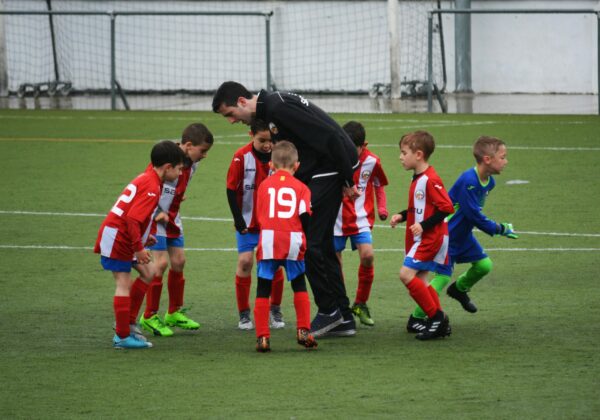Mistakes, everybody makes them right, but I believe that is where we learn the most and where we can gain the most knowledge.
As a coach educator, my job is to inspire and empower coaches of all abilities with knowledge of the game and help and support you to gain the qualifications required to coach at particular levels.
However, you still have to go out into the wide open world and gain new knowledge and experience failure and success for yourself.
I can explain to you lots of scenarios you may face and how to deal with them using my own experiences, mistakes and failures but in the end, you will only learn best from making your own.
Introduction
Soccer coaching can be a challenging and rewarding experience. As a coach, you have the power to shape your players’ future, helping them develop not only as athletes but also as individuals.
However, coaching can also be filled with pitfalls and mistakes that can hinder progress and growth.
In this article, we’ll explore the top ten mistakes soccer coaches make and how to avoid them, so you can try and ensure the success of your team.

Mistake #1: Focusing too much on winning
One of the most common mistakes new soccer coaches make is concentrating too much on winning.
While winning is an important part of any sport, it should not be the sole focus of your coaching.
When you focus too much on winning over player development, you risk sacrificing the long-term growth of your players for short-term gains.
Instead, turn your attention to creating a positive and supportive environment that encourages your players to improve their skills and helps them to grow as individuals.
Emphasise the importance of good sportsmanship, hard work, and determination, and teach your players to enjoy the game, regardless of the outcome.
Mistake #2: Neglecting individual player development
Another common mistake new soccer coaches make is neglecting individual player development. Whilst you should try to build a strong team, it is equally important to help each player develop their skills and abilities.
Read my article on How To Maximise Player Potential
Every player is unique, with their strengths, weaknesses, and learning styles. As a coach, it is key to recognise and address these individual needs to help each player reach their full potential.
Take the time to get to know your players and tailor your coaching approach to their specific needs. Make sure you provide your players with plenty of opportunities to work on their skills, such as dribbling, passing, and shooting.
Offer individual feedback and guidance, and encourage your players to set and work towards personal goals.
Mistake #3: Failing to communicate effectively
Clear communication is critical in soccer coaching, both with your players and with other coaches and parents.
Communication is also key to building a strong and cohesive team, and it is necessary to keep your players informed and engaged throughout the season.
Make sure you communicate your expectations to your players and encourage them to communicate with you as well.
Be open and receptive to feedback, and make sure your players know that they can come to you with any questions or concerns.
For more information click the link and read my article Why Effective Communication is the Ultimate Skill in Football
Mistake #4: Not providing enough feedback
Feedback is very important in helping players improve their skills and build confidence. As a coach, try and provide regular and constructive feedback to your players.
This can include positive reinforcement and constructive criticism, delivered in a supportive and helpful manner.

Mistake #5: Being too rigid in your coaching approach
New soccer coaches often make the mistake of failing to adapt their coaching style to the needs of their players. Every team and player is different, and it is important to be flexible and adaptable in your coaching approach.
While you should always have a plan and structure for your coaching sessions, being too rigid can hinder player development.
Pay attention to your players’ strengths and weaknesses, and adjust your coaching style accordingly. Some players may respond well to a more hands-on coaching approach, while others may prefer a more laid-back style.
By adapting your coaching style to the needs of your players, you can help them reach their full potential and achieve success on the field.
Mistake #6: Lack of organisation
Soccer coaching requires significant organisation, from creating session plans to managing game schedules and player registers.
Failing to stay organised can lead to confusion, missed opportunities, and a lack of progress for your team.
Use tools like calendars, checklists, and spreadsheets to stay on top of your coaching responsibilities.

Mistake #7: Poor time management
Time is a precious commodity in soccer coaching, and it is important to make the most of every minute.
Plan your sessions carefully, with a clear learning outcome, focus on specific skills or strategies, and avoid unnecessary distractions or delays.
Mistake #8: Ignoring the mental game
Soccer is as much a mental game as it is a physical one, and it is essential to address the mental aspects of the game in your coaching. Click here to read my article on How to Increase Mental Toughness
Encourage your players to develop mental toughness, focus, and resilience, and help them develop strategies for managing stress and pressure.
Mistake #9: Neglecting physical fitness
Soccer is a physically demanding sport, and players need to be in good physical shape to perform at their best.
it is crucial to incorporate fitness training into your coaching sessions and encourage players to maintain a healthy lifestyle outside of practice. Click here to read my article Football Fitness and the Facts you need to know
Mistake #10: Failing to lead by example
As a coach, you are a role model for your players, and it is very important to lead by example. This means demonstrating the values and behaviours you expect from your players, such as hard work, dedication, and sportsmanship.
Conclusion
Coaching a soccer team can be a challenging but rewarding experience, especially for new coaches.
Take action and apply these tips to your coaching approach today!
Remember, coaching is not just about winning but also about player development, clear communication, and effective coaching strategies.
Make sure to adapt your coaching style to the needs of your players, stay organized and manage your time wisely, address the mental and physical aspects of the game, and lead by example.
By doing so, you can help your team reach their full potential and achieve success both on and off the field.



Just wanted to say thanks for your work. I love your articles and often use them to help the coaches I am working with, I work with United Sikkim in NE India – thank you for all you do.
It’s my absolute pleasure. I enjoy sharing the knowledge I have gained over the years and I am so happy that it is useful for coaches like yourself, especially in different parts of the world.